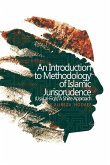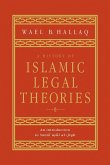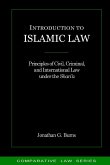An Outline of Islamic Jurisprudence is a salient effort at addressing the dearth of materials in the English language in the somewhat complex subject matter of classical jurisprudence. It highlights the uniqueness of Islamic jurisprudence as a developed system because of its exactitude in terms of meaning, province and scope. The book serves as a handy introductory text on the basic principles of Islamic jurisprudence for judges, lawyers, academicians, especially law lecturers, students of law specialising in Islamic law, and the general public. Dedication - Acknowledgements - Preface - Glossary- Chapter 1 Introduction to Islamic jurisprudence [Preamble; Definition of Fiqh; Definition of Usul; Definition of Usul al-Fiqh]; Chapter 2: Shari'ah - Islamic law [Definition of Islamic Law; Elements (Arkan) of Islamic Law]; Chapter 3: Obligations and duties [Introduction; Obligations created by the Hukm (rule of law); Duties created by the Hukm (rule of law); Chapter 4: Declaratory rule (Hukm Wad'i)[Classification of declaratory rule]; Chapter 5: Legal capacity (Ahliyyah)[Introduction ; Definition of Ahliyyah; Types of Ahliyyah; Classification of legal capacity; Factors affecting complete legal capacity]; Chapter 6: Right - Haqq [Introduction; Classification of rights; Classification of rights in Islamic criminal law]; Chapter 7: The sources of Islamic law [Introduction; Definition; The classification of the sources; The order of the sources]; Chapter 8: The primary sources [Introduction; Holy Qur'an; Compilation of the Holy Qur'an; The difference in the two compilations; Holy Qur'an as the primary source; Ijma - consensus of opinion]; Chapter 9: The secondary sources [Introduction; Qiyas - analogical deduction; Istihsab - juristic equity or preference; Maslahah Mursalah or Istislah - considerations of public interest or extended analogy; Istishab - presumption of continuity; Urf - custom; Sadd al-Dhara'i - blocking the means]; Chapter 10: Ijtihad [Introduction; Authority for the exercise Ijtihad; Types of Ijtihad; Taqlid]; Bibliography; Index Dr Yahaya Y. Bambale, former Head, Department of Islamic Law, and Assistant Dean for both undergraduate and postgraduate studies in the Faculty of Law, Ahmadu Bello University, Zaria, Nigeria, is a Reader. His currently on sabbatical leave at the IBB University, Lapai, Niger State of Nigeria where he is the Dean of Students. He is the author of Crimes and Punishment Under Islamic Law.
Hinweis: Dieser Artikel kann nur an eine deutsche Lieferadresse ausgeliefert werden.
Hinweis: Dieser Artikel kann nur an eine deutsche Lieferadresse ausgeliefert werden.








